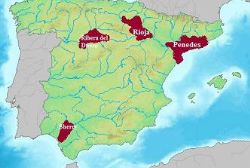- Business
- Childbirth & Education
- Legal Formalities
- Motoring
- Other
- Pensions & Benefits
- Property & Accommodation
- Taxes
- Airports and Airlines Spain
- Paramount Theme Park Murcia Spain
- Corvera International Airport Murcia Spain
- Join us for Tea on the Terrace
- When Expat Eyes Are Smiling
- Meet Wincham at The Homes, Gardens & Lifestyle Show, Calpe
- QROPS 2014
- Spain Increases IHT in Valencia & Murcia
- Removals to Spain v Exports from Spain
- The Charm of Seville
- Gibraltar Relations
- Retiro Park : Madrid
- Community Insurance in Spain
- Calendar Girls
- Considerations when Insuring your Boat in Spain
- QROPS – HMRC Introduces changes that create havoc in the market place
- QROPS – All Change From April 2012
- Liva & Laia : 15th November

One university in southern Spain is set on bringing fame to it's region through the discovery of a type of wine which existed in Roman times.
Researchers from Universidad Pable de Olavide (UPO) in Seville have begun "Olavidium", a project in which the team will try to create a naturally sweet wine with up to 16 percent alcohol content, very little oxidation and all with the absence of of additives.
The key to the process, UPO research Juan Jimenez told Europa Press this past week, is a natural yeast found in Spain's southern region of Andalusia.
"There are various natural Andalusian wines, but this peculiarity which we've found is the presence of a native yeast which could be used abundantly, even though we haven't been able to demonstrate adequately up to this point," Jimenez said.
The researcher, according to the Europa Press story, has been studying this specific wine compound for 30 years. The years, Jimenez said, is unique and exceptional and performed well in a recent text in which the substance was used in a 800-liter batch of wine.
Until now, the mystery leaven had only been used in laboratory tests, Jimenez said. In order to realistically understand the possibilities of the ingredient, tests would have to be carried out on a semi-industrial level, Jimenez told Europa Press.
The desire to move forward with the project is tied to the yeast's glorious past, he said.
"The premise, according to Jimenez, has been of improving upon a tradition of thousands of years – 'which the Romans were already doing' – of a vinification 'with an exceptional amount of alcohol without any conservatives.'"
Jimenez and his colleagues believe their history-based supposition about the mystery yeast will be an important discovery for his team and for southern Spain's wine culture.
More than just a research product to find new winemaking methods, Jimenez told Europa Press the discovery has the potential to raise the level of Andalusia's regional pride. The researcher said, compared to other winemaking regions in Spain, Andalusia is relatively unknown.
"I don't like the idea that our wineries don't feel appreciated," he said in his interview. "They're exceptional."
He predicts the project will require at least three years in order to fully flesh out its potential for commercial use.
The ambitious project won an award at the 2014 Sixth annual Conference of Ideas and Innovative Business Ideas this past June.
Recommended Reading :
* Lidl Spain defends underpricing wine
* Spanish wine production rebounds 25% in 2013










